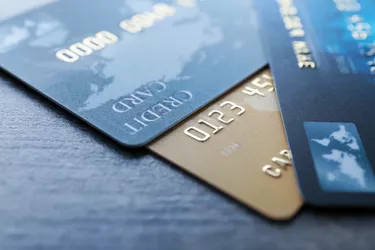The abbreviation MM/YYYY on a credit or debit card refers to the two-digit month and four-digit year of the card's expiration date. If this date has passed, you won't be able to use your card, so make sure your bank sends you a new one before your old card expires. The expiration date is also sometimes used for security purposes; so don't share it more widely than necessary.

Video of the Day
MM/YYYY Confusion
The abbreviation MM/YYYY might look confusing if you're unfamiliar with it, but it's simply a way of representing a date. The "MM" bit means that you should always use the two-digit representation of the month, so January is "01" and November is "11." Similarly, the "YYYY" element means you should use all four digits of the year. That is, write out "2020" or "2018," not just the last two digits.
Video of the Day
When Your Card Expires
While you can no longer use an expired card in stores or for first-time online purchases from a merchant, if your card is already registered with a merchant site like Amazon.com, or you have arranged scheduled online payments in advance, such as with your cable or utility company, it is likely that these companies will receive your updated card information and you won't have to update it yourself. Major credit card companies offer updater services to provide merchants with consumers' new credit card numbers and expiration dates. However, it's always a good idea to check and see if your card was automatically updated for scheduled payments.
Your credit card company should send you a new card before the old one expires. If you notice it's getting close to the expiration date and you haven't received a new card, you can call to ensure it's on its way. Once you have your new card, you'll usually need to activate it online or over the phone. If it's a prepaid card, you might have to pay a fee to avoid losing the money you have on the card.
The credit card company will also tell you how to dispose of your old card, generally either by destroying it with scissors or a shredder.
Keep Your Expiration Date Secret
When you make credit purchases online, merchants will often ask for your card's expiration date. This isn't just to make sure your card is still valid. It's an added measure of security, making it less likely that someone else is using your card number without your permission. This way, a thief who only has your card number and not the date can't make a purchase in your name. It's also illegal for merchants to print the expiration date on receipts you get in stores.
What Else Is on Your Card
In addition to the expiration date in that MM/YYYY format, credit and debit cards will also include other numbers.
The main number is the credit card account number itself, which you'll need to make purchases, contact your credit card company with questions and often to set up online banking or pay your bills. There's also an additional security code, sometimes called a card verification value or CVV code, that's sometimes necessary to make online purchases or pay for things over the phone.
It's another way for the companies with whom you're doing business to ensure you're actually you and in possession of your card.